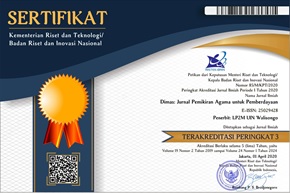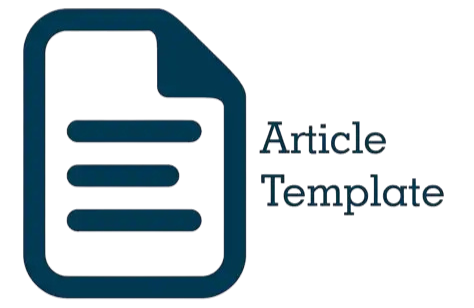Pendampingan Peningkatan Mutu Madrasah melalui Pembelajaran Aktif dan Manajemen Sekolah
DOI:
https://doi.org/10.21580/dms.2018.182.3037Keywords:
Pakem, Pembelajaran kontekstual, Manajemen Berbasis SekolahAbstract
Active, Creative, Effective and Enjoyable Learning (PAKEM) is a contextual learning model that involves at least four main principles in the learning process. First, the interaction process (students interact actively with teachers, fellow students, multimedia, references, environment, etc.). Second, the communication process (students communicate their learning experiences with teachers and other student colleagues through stories, dialogues or through role-play simulations). Third, the reflection process (students rethink the meaning of what they have learned and what they have done). Fourth, the exploration process (students experience directly by involving all their senses through observation, experiment, investigation or interview). PAKEM training is conducted for 2 days and SBM training is conducted for 1 day. After the training, there were mentoring for teachers on the practice of active learning and there was mentoring for SBM to install RKS and RKAS in the madrasas. Training does not mean anything without implementation and follow-up.
Penelitian Pembelajaran Aktif, Kreatif, Efektif dan Menyenangkan (PAKEM) adalah sebuah model pembelajaran kontekstual yang melibatkan paling sedikit empat prinsip utama dalam proses pembelajarannya. Pertama, proses interaksi (siswa berinteraksi secara aktif dengan guru, rekan siswa, multimedia, referensi, lingkungan, dan sebagainya). Kedua, proses komunikasi (siswa mengkomunikasikan pengalaman belajar mereka dengan guru dan rekan siswa lain melalui cerita, dialog atau melalui simulasi role-play). Ketiga, proses refleksi (siswa memikirkan kembali tentang kebermaknaan apa yang mereka telah pelajari dan apa yang mereka telah lakukan). Keempat, proses eksplorasi (siswa mengalami langsung dengan melibatkan semua indera mereka melalui pengamatan, percobaan, penyelidikan atau wawancara). Pelatihan PAKEM dilakukan selama 2 hari dan pelatihan MBS dilakukan selama 1 hari. Setelah pelatihan, diadakan pendampingan terhadap guru-guru terhadap praktik pembelajaran aktif dan ada pendampingan MBS untuk pemasangan RKS dan RKAS di madrasah-madrasah tersebut. Pelatihan memang tidak akan ada artinya tanpa pelaksanaan dan tindak lanjut.
Downloads
References
Donoseputro, M, Pelaksanaan Otonomi Daerah dalam Upaya Pencapaian Tujuan Pendidikan: Mencerdaskan Kehidupan Bangsa, Suara Guru, 1997
Gaynor, Cathy, Decentralization of Education:Teacher Management, Washington, DC, World Bank dalam Nuril Huda “Desentralisasi Pendidikan: Pelaksanaan dan Permasalahannya”. Jurnal Pendidikan dan Kebudayaan, No. 017 Tahun ke-5, Juni 1999
Miftah Thoha, “Desentralisasi Pendidikan”, Jurnal Pendidikan, No. 017, tahun ke-5, Juni 1999
Sukamto, Tuti dan Winataputra, Udin S, Teori Belajar dan Model-Model Pembelajaran. (Jakarta: Depdikbud, 1996)
Sukandi, Ujang, dkk, Belajar Aktif Dan Terpadu, Apa, Mengapa Dan Bagaimana?, (Surabaya: Duta Graha Pustaka, 2003)
Usaid Prioritas, Modul Pelatihan: Praktik yang Baik di Sekolah Menengah Pertama/Madrasah Tsanawiyah, (Jakarta:Usaid, 2013)
Usaid Prioritas, Modul Pelatihan: Praktik yang Baik di Sekolah Menengah Pertama/Madrasah Tsanawiyah Modul 2, (Jakarta:Usaid, 2014)
Usaid Prioritas, Modul Pelatihan: Praktik yang Baik di Sekolah Menengah Pertama/Madrasah Tsanawiyah Modul 3, (Jakarta:Usaid, 2015)
Winkel, W.S., Psikologi Pembelajaran dan Evaluasi Belajar, (Jakarta:Gramedia, 1988)
Winkel, W.S., Psikologi Pembelajaran dan Evaluasi Belajar, (Jakarta:Gramedia, 1988),
Downloads
Published
Issue
Section
License
Copyright
The copyright of the received article shall be assigned to the journal as the publisher of the journal. The intended copyright includes the right to publish the article in various forms (including reprints). The journal maintains the publishing rights to the published articles. Therefore, the author must submit a statement of the Copyright Transfer Agreement.*)
Licensing

This work is licensed under a Creative Commons Attribution-ShareAlike 4.0 International License.
In line with the license, authors are allowed to share and adapt the material. In addition, the material must be given appropriate credit, provided with a link to the license, and indicated if changes were made. If authors remix, transform or build upon the material, authors must distribute their contributions under the same license as the original.
_______
*) Authors whose articles are accepted for publication will receive confirmation via email and send a Copyright Transfer Agreement.









